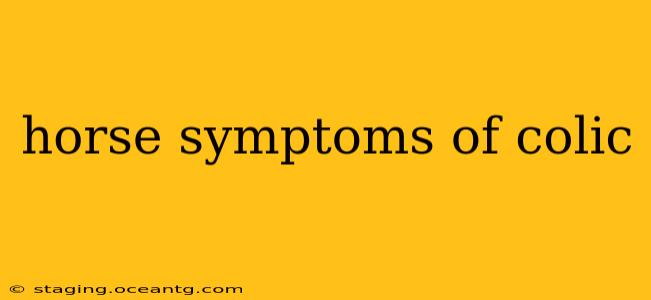Colic in horses is a general term for abdominal pain. It's a serious condition that can range from mild discomfort to life-threatening emergencies. Early recognition of colic symptoms is crucial for a positive outcome, as prompt veterinary intervention significantly improves the chances of recovery. This article will delve into the various signs of colic, helping you understand how to identify this potentially fatal condition and what steps to take.
What are the common signs of colic in horses?
The symptoms of colic are diverse and can vary in severity, making diagnosis challenging. Horses often exhibit subtle changes in behavior before more dramatic signs appear. These subtle changes might include:
- Loss of appetite: This is often one of the first signs. A horse refusing its usual feed, even treats it normally devours, should raise a red flag.
- Changes in demeanor: A usually placid horse might become restless, anxious, or depressed. They might paw the ground excessively or look repeatedly at their flanks.
- Mild abdominal discomfort: Some horses will exhibit signs of mild discomfort, such as lying down and getting up frequently or stretching out.
More severe symptoms often indicate a more urgent situation and require immediate veterinary attention:
- Rolling: Repeated rolling, often accompanied by thrashing, is a significant sign of severe pain. This behavior can be dangerous, as the horse risks injuring itself.
- Kicking at the abdomen: The horse might repeatedly kick or strike at its belly, indicating intense abdominal pain.
- Sweating: Excessive sweating, even in cool weather, is a common sign of pain and distress.
- Rapid or shallow breathing: Changes in breathing pattern can indicate the severity of the colic.
- Elevated heart rate: A racing heart is another indicator of pain and stress.
- Straining to urinate or defecate: The horse may show signs of straining, but little or no urine or feces are produced.
- Dehydration: Colic can lead to dehydration, which is characterized by dry gums and sunken eyes.
- Pale gums: Pale gums can indicate shock and are a serious sign.
What are the different types of colic?
Colic isn't a single disease but rather a symptom of various underlying problems. These can include:
- Gas colic: This is caused by a buildup of gas in the intestines.
- Impaction colic: This occurs when the intestinal tract becomes blocked by impacted feed or feces.
- Strangulation colic: This is a life-threatening condition where a portion of the intestine is twisted or trapped, cutting off its blood supply. This requires immediate veterinary surgery.
- Displacement colic: Involves the shifting or displacement of the intestines.
- Intestinal inflammation: Inflammation of the intestinal lining can also lead to colic.
How is colic diagnosed?
Veterinarians diagnose colic through a combination of physical examination, including checking vital signs, listening to the gut sounds with a stethoscope, and rectal examination. Blood tests and ultrasound may also be used to assess the severity and pinpoint the cause of the colic.
What is the treatment for colic?
Treatment depends on the underlying cause and severity of the colic. It may involve pain management, fluid therapy, and medication to stimulate gut motility. In severe cases, surgery may be necessary.
How can I prevent colic in my horse?
While not all cases of colic are preventable, several management practices can significantly reduce the risk:
- Regular feeding schedule: Avoid overfeeding and ensure a balanced diet.
- Access to clean water: Dehydration can contribute to colic.
- Regular exercise: Maintaining a consistent exercise routine helps promote healthy digestion.
- Dental care: Proper dental care ensures efficient chewing and digestion.
- Minimize stress: Stress can affect digestion and increase the risk of colic.
Can I treat colic at home?
No. Colic is a veterinary emergency. While you can monitor your horse and provide supportive care like ensuring access to clean water, never attempt to treat colic at home. Contact your veterinarian immediately if you suspect your horse has colic. Early intervention is crucial to improve the chances of a positive outcome. Delaying veterinary care can be fatal.
What should I do if I suspect my horse has colic?
Call your veterinarian immediately. The sooner they can assess your horse, the better the chances of a successful outcome. While waiting for the vet, keep your horse calm and comfortable. Avoid giving any medications without veterinary advice. Accurate and timely veterinary intervention is paramount in managing this life-threatening condition.
Remember, this information is for educational purposes only and does not substitute professional veterinary advice. Always consult with a veterinarian for any health concerns related to your horse.
